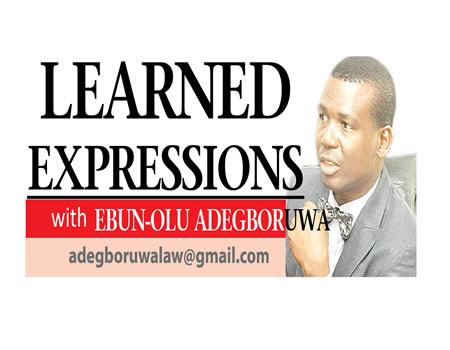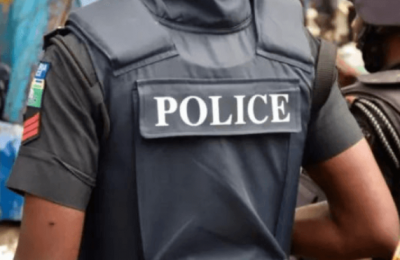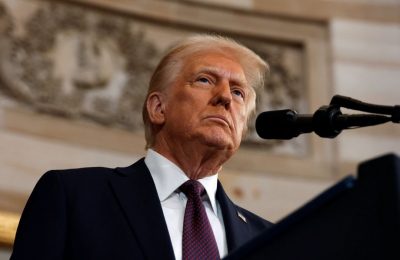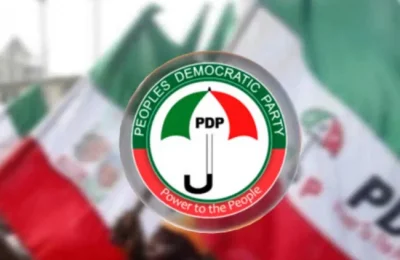
By EBUN-OLU ADEGBORUWA, SAN

In Part 1 of the paper delivered at the reception in honour of the newly-appointed Chief Judge of Ondo State, we examined the impact of the judiciary on our democratic experience as a nation. In this concluding part, the focus is on the specific roles that the judiciary has played and should continue to play in the development of democracy in Nigeria.
Democracy in Nigeria
Nigeria’s history has been dominated by fraudulent elections, violent political conflicts and military coups. The country’s two previous attempts at democratic rule (1960-66 and 1979-83) were both dogged by allegations of electoral fraud and violence before they were cut short by military coups. Despite repeated promise to abide by the rule of law, elections continued to be perceived as a do or die affair. As soon as election results are announced, defeated political aspirants will engineer their political thugs to unleash violence and try to have their perceived enemies harassed to surrender. Since the return to democratic rule on 29th May, 1999, a major behavioural shift has occurred among Nigerian politicians. While some politicians continue to practice violence and political thuggery, many more now prefer to embrace judicial channels for conflict resolution. This change springs from the transformation within the judiciary itself which has since 1999 played an increasingly exertive role. The clearest evidence of this fact is the increasing number of judicial decisions that have upturned the result of several rigged elections in favour of opposition parties or individuals opposed to the government and the dominant political party. The Supreme Court alone was said to have delivered 277 judgments in six months. The admonition here is for the judiciary to be more courageous in the discharge of its constitutional role as an impartial arbiter in the country’s democratic politics in general. To round off this point, I dare say that democratic government in Nigeria should therefore be organized in accordance with the principles of popular consultation, majority will, political and economic equality, majority rule and popular sovereignty of the people.
The role of the Judiciary
Today, the role of the judiciary in the nation has become extremely important because it sets different guidelines for the smooth and legitimate functioning of various governments and non-governmental sectors. Any nation could easily enter a crisis without law and order and then instability may prevail. Therefore, every country needs to have an effective system of law and order that can be guaranteed by a sound and impartial judicial system. The judiciary, as guardian of the Constitution, has the power to declare invalid any legislation, policy or action which, in its view, are contrary to the provisions of the Constitution. The power of judicial review ensures that the rights and interests of the people of Nigeria cannot be overridden by either the Legislature or the Executive. Whenever a person thinks he or she is being deprived of his or her rights as a citizen, he/she is entitled to approach the court. As we all know, cases of injustice against the people have risen nowadays due to varied reasons. There is unjust discrimination happening, and therefore, the judiciary must step in to prevent this. There is no question that politicians and bureaucrats have failed in their responsibilities to give this country a clean, honest government that is accountable to the masses. It is the judiciary alone that can assert itself without fear or favour, calling a spade a spade. Without the right judiciary, no country would be in peace, and there’ll be confusion everywhere in the country. In this regard, our courts must ensure that aggrieved persons get justice and that extant laws and regulations are enforced. It is necessary to let the law of the land prevail and this can happen only if the judiciary is made stronger. It is important to ensure a swift and successful administration of justice for all. Nigeria only survives if her judicial system lives; Nigeria dies if it stifles its judicial system. No power should be enabled, however great, to override the judicial process. The secret of democratic advancement for this country is free and equal justice.
Promoting the rule of law in governance
The basic difference between tyranny, dictatorship and democracy in my view is the regulatory effect of law on society. The rule of law presupposes the legal principle that law should govern a nation, and not arbitrary decisions by individual government officials. It primarily refers to the influence and authority of law within the society, particularly as a constraint upon behaviour, including the behaviour of government officials. The rule of law implies that every citizen is subject to the law of the land, including lawmakers themselves. In this sense, the judiciary must resist and confront any resort to autocracy, dictatorship, or oligarchy where the rulers hold themselves high and above the law, as could be seen in the decision of the Supreme Court in the case of Governor of Lagos State v. Ojukwu (1986) NWLR (Pt. 18) 621.
Safeguard of the fundamental rights of citizens
The United Nations General Assembly High-level Meeting on the Rule of Law, held on September 24, 2010 declared thus:
“Human rights, the rule of law and democracy are interlinked and mutually reinforcing and that they belong to the universal and indivisible core values and principles of the United Nations” Indeed, government responsiveness to the interests and needs of the greatest number of citizens is strictly associated with the capacity of democratic institutions and processes to bolster the dimensions of rights, equality and accountability.”
The above declaration captures the essence of protecting the fundamental rights of citizens in a democracy. Thankfully, the Nigerian Constitution has also attached great importance to this, with its devotion of a whole chapter (IV) for this purpose. This is an important function of law in a democratic society, for in the absence of a legal mechanism to safeguard the rights of the people, society slides into the Hobbesian state where might is right and where life is nasty, short and brutish.
Checks and balances/separation of power
The modern idea of separation of powers is to be found in one of the most important eighteenth-century works on political science, the Baron de Montesquieu’s The Spirit of the Laws (1748), which states that: “There can be no liberty where the legislative and executive powers are united in the same person, or body of magistrates … [or] if the power of judging be not separated from the legislative and executive powers.” In Federalist No. 47 (1788) James Madison, commenting on Montesquieu’s views and seeking to reconcile them with the Constitution’s provisions, states that: “The accumulation of all powers, legislative, executive, and judiciary, in the same hands, whether of one, a few, or many, and whether hereditary, self-appointed, or elective, may justly be pronounced the very definition of tyranny.” From Baron de Montesquieu’s titling of his work “spirit of law”, it leaves no one in doubt that it is the law that separates, shares and limits the various powers of the three arms of government. This is a veritable ingredient of democracy and the same must be jealously guarded.
Judicial powers in democratic societies
There are specific attributes that must be found in a democratic society. One of these is the presence of an accountability mechanism whereby public officials are held accountable by, and answerable to, the public for both their actions and decisions. This ensures that public officials are constantly watched in order to avoid bad governance or instances of abuse of power. Although the media has been granted the power to hold the government accountable to the people under section 22 of the Constitution, there is need for judicial protection for this power to become effective. In a constitutional democracy, the concept of separation of powers permits and fosters dialogue between the three branches of government in order to achieve the goals stipulated in the Constitution. As such, the judiciary, as the organ empowered to interpret and apply the law, can determine whether the legislature and executive are performing their duties as spelt out in the Constitution. Judicial power connotes the authority vested in the courts to declare and interpret the law. In democratic societies, this power is used as an enforcement mechanism of the peoples’ rights because the courts can be called upon at any time, by any individual, to adjudicate on the legality of an act: in fact, judicial power can be utilized by a people to cause the judiciary to rule on whether an executive or legislative act is compatible with the Constitution. In short, the judiciary is inadvertently translated to an agent of human rights enforcement by ensuring that the contents of human rights instruments, applicable in that country, are employed as sources of law in the settlement of human rights disputes in particular and other disputes in general. The judiciary should use this power vested in it by the supreme law of the land to sanction instances of executive and legislative excesses which negatively impact upon the rights of a people, which, in turn, would positively enhance the core civil and political rights contained in our laws and other international instruments. The judiciary plays a great role towards advancing human rights and democracy in a country. Where dictatorship reigns, the judiciary should be held responsible.
Conclusion
I want to conclude by saying that the judiciary is the live wire of any democracy and as such, privileged men and women who occupy this exalted Bench should ensure that they continue to discharge their responsibilities as spelt out in our Constitution effectively. Justice should not be given to the highest bidder or political benefactors. We should ensure that the basic belief that all men are born equal and deserve true justice is followed to the letter. Democracy is an expensive choice and we should do all we can within our reach to keep it and consign its adversaries to the barracks. By doing this we will avoid anarchy and cracks in the very foundation of this country.
YOU SHOULD NOT MISS THESE HEADLINES FROM NIGERIAN TRIBUNE
Treason: Obi, Datti’s comments don’t violate Section 37 of criminal code — Falana
Leading rights lawyer, Mr. Femi Falana on Thursday dismissed the claim by the Buhari administration that the Labour Party presidential team of Peter Obi and Datti Ahmed is engaging in subversive acts…
Obi threatens lawsuit against Peoples Gazette, says leaked audio fake
Presidential candidate of the Labour Party in the February 25 elections, Peter Obi, has dismissed leaked audio of an alleged conversation between him and Bishop David Oyedepo, founder of Living Faith Church Worldwide, as fake.…
Whitney Adeniran: Lagos govt places Chrisland school on probation
Chrisland High School in Ikeja, Lagos, has been placed on probation by the Lagos State Government for one academic session to monitor adherence to safety policies and guidelines…
Ilorin youths clash, destroy 25 cars over girlfriend in JSS class
At least, 25 cars were destroyed as youths from Itamerin and Ode Popo communities lay claim to the boyfriend of one Aisha, a JSS student.…
Super Falcons kick off training in Turkey ahead of international friendlies
Nigeria’s Super Falcons on Wednesday in Antalya had their first training session since arrival in Turkey on Tuesday ahead of the international friendlies against Haiti and New Zealand…
EDITORIAL: DSS alarm on interim government
SINCE last week’s declaration by the Department of State Services (DSS) that some members of the political class were plotting an interim government to truncate the smooth handing over of power by President Muhammadu Buhari,…








